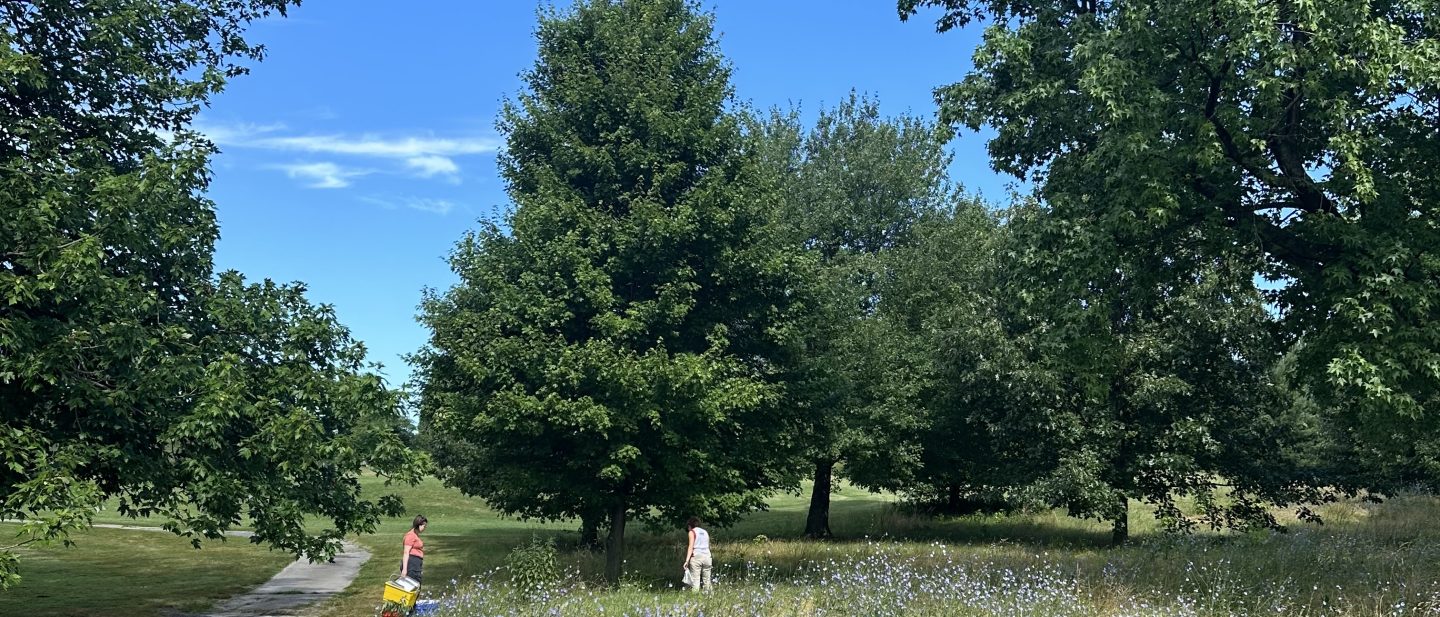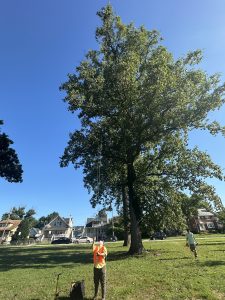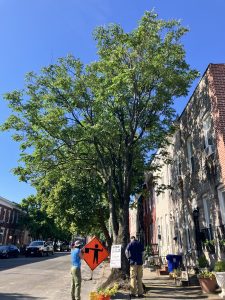
This summer, graduate student Sam Votzke and undergraduate Olivia Bond conducted a field work campaign across Baltimore City to survey urban trees and soils. The field campaign was part of the research efforts of the Vegetation, Soils, and Ecosystems team within the Baltimore Social-Environmental Collaborative (BSEC).
Votzke, a second-year graduate student in the Earth and Planetary Sciences Department at JHU, is jointly advised by Dr. Meghan Avolio and Dr. Katalin Szlavecz. Her primary research focuses areurban trees and soils. Votzke is from Tampa, Florida, and studied Environmental Science at Duke University as an undergraduate. She worked for several years in the environmental field before beginning her graduate career at JHU.
Bond, an undergraduate senior studying Environmental Science at the JHU Krieger School of Arts and Sciences, is from northern Virginia. Before coming to the Homewood campus, Bond pursued a cello degree at the Peabody Institute. She joined BSEC as a summer intern and worked closely alongside Votzke.
Throughout the summer, Votzke and Bond collected tree and soil samples across the city with a team of undergraduate interns. The team gathered physiological measurements for certain tree species (such as photosynthetic capacity, height, canopy width, and diameter at breast height), and measured various properties (such as moisture and compaction) of the soil surrounding each tree. Samples were taken in three different types of urban habitats: streets, urban forests, and urban parks.
We sat down with Votzke and Bond to learn more about their research:
Describe the intention of the research as it relates to environmentalism and the climate.
“This research is the first step in asking more questions about what is going on in Baltimore,” says Votzke. “We want to take a baseline assessment of how healthy our trees are, how healthy our soils are, and how well they are coping with [environmental stressors].”
By assessing tree and soil health, a greater understanding of how different tree species respond to environmental conditions can be gained, as well as an understanding of how such species respond in different habitats across the city.

According to the BSEC Vegetation, Soils, and Ecosystems team website, “Research to match tree species with soil conditions can guide Baltimore’s investment in tree planting.” In many cities, tree planting has been used as a strategy to address climate change and stormwater runoff, and Baltimore is “investing heavily” in such projects. Thus, this understanding of Baltimore’s trees and soils is critical to informing tree planting decisions and achieving the city’s goals of increasing canopy cover across Baltimore.
What is the importance of environmentally-focused research?
For Bond, valuing and preserving green spaces, especially in cities, is important for human well-being.
“The city can become a lot of concrete and buildings and it’s really important for humans to have those places where they can interact with nature,” says Bond. “Trees, specifically, make it a much more comfortable place for humans to live.”
Votzke agrees, emphasizing the importance of access to nature and the environment in promoting human health and happiness.
“If we can say [through research] that there’s more proof in Baltimore that we should be planting trees in neighborhoods and that we should be taking care to keep the trees that we already have in a healthy state,” says Votzke. “That will benefit all of us.”
Trees, specifically, in the city make it a much more comfortable place for humans to live.”
For Votzke, environmentally-focused research in an age of climate change is critical.
“The research is our way of keeping our finger on the pulse of what’s going on in the environment,” says Votzke. “It’s our way of telling what kind of changes are happening, how fast are they happening, and what kind of things we can do to help.”
What is the value in participating in such research as an undergraduate?
For Bond, this summer was her first introduction to research.

“I really enjoyed working with BSEC this summer,” she says. “It was beneficial to get to know the researchers in the Earth and Planetary Sciences Department and to learn about all the different kinds of research we are doing here.”
Bond enjoyed the physical elements of fieldwork, too. Getting her hands dirty, going into the city each day, and wrapping her arms around a tree – each of these experiences Bond valued from her summer.
What is the value in participating in such research as a graduate student?
For Votzke, this summer provided many valuable learning experiences.
“In my working life I had been a research assistant, but so much of that was confined to the lab and none of it was something I was in charge of,” says Votzke. “Being able to work through problems, troubleshoot, physically be out in the field, and essentially be responsible for A-Z of data collection, was a really great experience.”
Managing and working alongside undergraduate students was a “huge learning curve” for Votzke, as well. “It was such a huge effort from so many sides.”
What are some future steps for this project?
 “Because of various hiccups that we had this summer, we’re definitely going to be continuing in the same vein next summer and getting more tree and soil samples,” says Votzke.
“Because of various hiccups that we had this summer, we’re definitely going to be continuing in the same vein next summer and getting more tree and soil samples,” says Votzke.
This research, however, is not only a part of BSEC’s larger mission, but a part of Votzke’s graduate work, as well.
“Now I’m working on figuring out what the other questions are that I want to be asking about the trees and soils within this project,” says Votzke. “There’s so many questions out there that I’m trying to explore at the moment, so we’ll see. But I’m excited to do it again, and to go beyond.”
How did you get involved with environmentally-focused work?
“I was always a nature girly growing up,” says Bond. “I love going on hikes, I love the outdoors.”
During her time at the Peabody Institute, Bond was neighbors with a senior lawyer at the Environmental Protection Agency (EPA), who suggested that Bond participate in an EPA internship program.
“It was very inspirational to work with people who started in the EPA at the beginning of their career and never wanted to leave because their work was so fulfilling,” says Bond. “To be able to say every single day that you are making a tangible improvement in other people’s lives because you are defending the environment is inspirational.”

That internship experience inspired Bond to apply to JHU and to pursue Environmental Sciences.
Votzke recalls her childhood home’s yard, where her mother and grandfather gardened, filled with ferns, bromeliads, alocasias, an oak tree, and her grandfather’s saguaro cactus. Growing up, she spent ample time visiting state parks and beaches, she says. From these experiences, Votzke began to develop a connection to the environment.
At Duke, Votzke says she immediately declared as an Environmental Science major. During her junior year, her botany and plant identification professor became a mentor that inspired many of her subsequent internships and work experiences.
“I’m glad that I worked before I went back to grad school, and I’m glad I worked for a long time,” says Votzke. “That gave me time to explore what was going on in this giant field of environmental sciences, and figure out what kind of thing I want to be studying and working towards.”